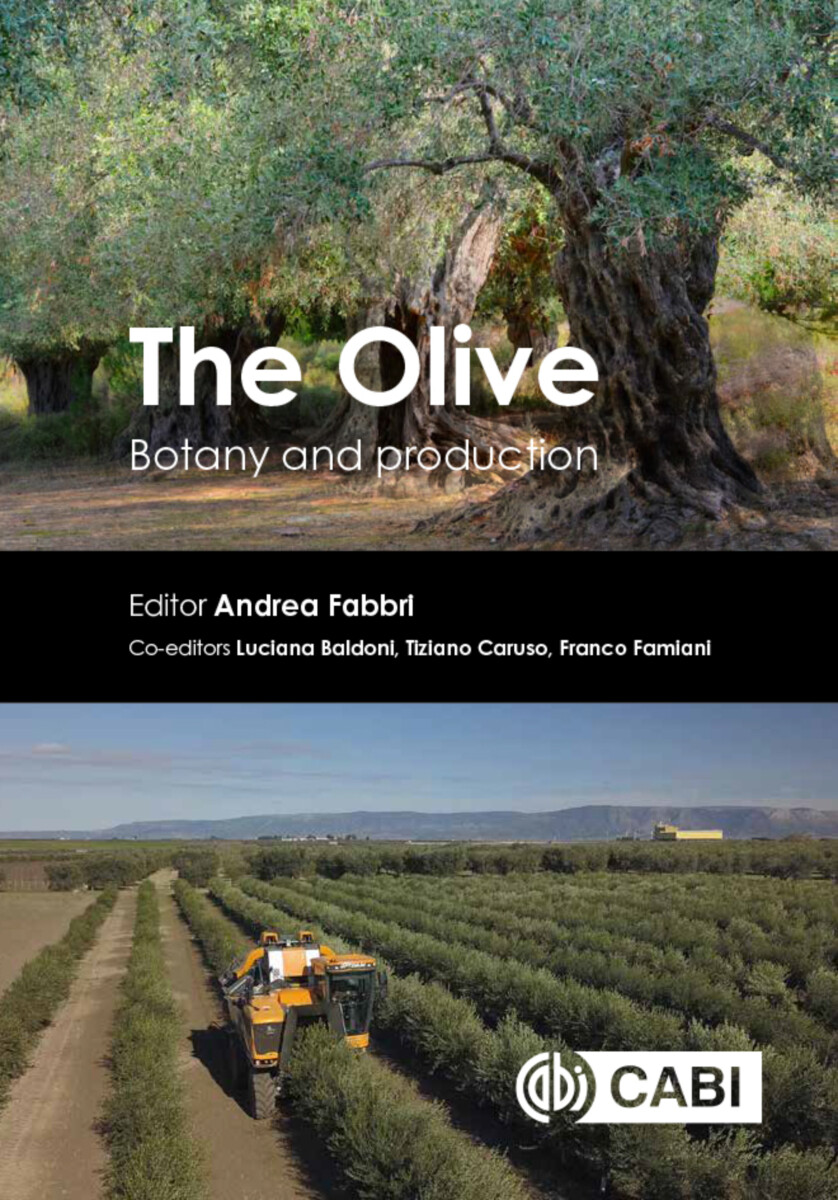The Olive
Botany and Production
- Publisher
CABI - Published
12th January 2024 - ISBN 9781789247336
- Language English
- Pages 656 pp.
- Size 6" x 9"
The European or Mediterranean cultivated olive (Olea europaea L., subsp. europaea, var. europaea) is one of the most ancient cultivated fruit tree crops. Today, hundreds of olive varieties are grown to produce high-quality fruit for oil and for table olives consumption. The olive industry has undergone profound innovations in the past 30 years, due to scientific and technical advances, particularly in genomics, breeding, orchard management, mechanization and agro-ecology, although not all these developments are yet available to smaller producers.
Olive cultivation has also spread to many countries outside the Mediterranean Basin, where it has been traditionally present for over 6,000 years. These new olive-growing countries are experiencing further expansion of the industry, due to increased awareness of the nutritional and health properties of extra virgin olive oil.
This book is a much-needed update on olive biology and cultivation, with contributions from leading international experts, and includes:
- Biology
- Genetics and breeding
- Olive propagation and nursery
- Planting new olive orchards
- Horticultural management of olive orchards
- Plant protection
- Olive by-products (wood, leaves)
- Multifunctionality of olive groves and ecosystem services
1. A short history of the olive--Andrea Fabbri, Parma University, Italy
2. Biology
3. Genetics and Breeding
4. Olive Propagation and Nursery
7. Plant protection
8. Olive by-products (wood, leaves)
9. Multifunctionality of olive groves and ecosystem services
Andrea Fabbri
Andrea Fabbri graduated in Agriculture at Florence University in 1975. In 2001 he was nominated Full Professor of Arboriculture and Pomology at Parma University, where he still teaches Plant Production. His research activity has focused on several topics of fruit trees physiology: propagation, anatomy and physiology, germplasm studies, on olive, grapevine, chestnut and many other fruit species. Some of these topics have been developed during two fellowships in Davis (USA), and one in Seville (Spain). His research activity is witnessed by over 160 scientific papers in extenso (scientific articles, proceedings, books and book chapters), and over 100 abstracts, extension articles, etc.
Luciana Baldoni
Dr. Baldoni is the Research Director at the National Research Council, Institute of Biosciences and Bioresources, Perugia, Italy. The main focus of her research includes the biology, genetics, genomics and breeding of the olive (Olea europaea L.), with current activities carried out on genotyping of olive cultivars and wild olive populations and analysis of their genetic relationships, domestication and origin; functional characterization of genes and regulatory elements involved in important metabolic pathways, including oil accumulation, phenol and terpene synthesis, flowering and tree architecture; genome and transcriptome sequencing; evaluation of a plant's response to environmental stresses (drought, salt); analysis of self- and inter-incompatibility systems; development of SNPs, polynucleotide SSRs, plastidial and mitochondrial markers; management of olive cultivar collections and inter-varietal cross progenies.
Tiziano Caruso
Dr. Tiziano Caruso is Full professor of Horticulture, University of Palermo, Italy. He graduated at the Faculty of Agricultural Science - University of Palermo, (Italy). In the past decades his research activity has mainly focused on the morphological and molecular characterization of Mediterranean fruit tree genetic resources (olive and pistachio) and on the horticultural and eco-physiological evaluation of cultivars and rootstocks of temperate zone tree fruit (peach, cherry) in intensive and super intensive planting systems.He is Author/Co-author of more than 70 scientific papers published in peer-reviewed journals and more than 150 scientific and technology transfer papers published in national and in international journals.Prof. Caruso is a fellow of the Italian Society of Horticultural Science, the Italian Academy of Olive and Oil and of the Accademia dei Georgofili (Italy) and he is Chair of the Division Temperate Tree Nut of ISHS and member of various ISHS working groups.
Franco Famiani
Dr. Franco Famiani is Associate Professor at the Department of Agricultural, Food and Environmental Sciences of the University of Perugia. He has carried out research on the biology, physiology and cultivation techniques of the olive tree. He was a lecturer at the International Masters in Olive Growing and Olive Oil Technology held by the University of Perugia in collaboration with the International Olive Council (COI). He was coordinator of the Olive and Oil Working Group of the Italian Horticultural Society (SOI). He has worked as an expert/teacher in many countries in the context of international projects concerning olive growing. He is a member of the Council of the National Academy of Olives and Oil.


